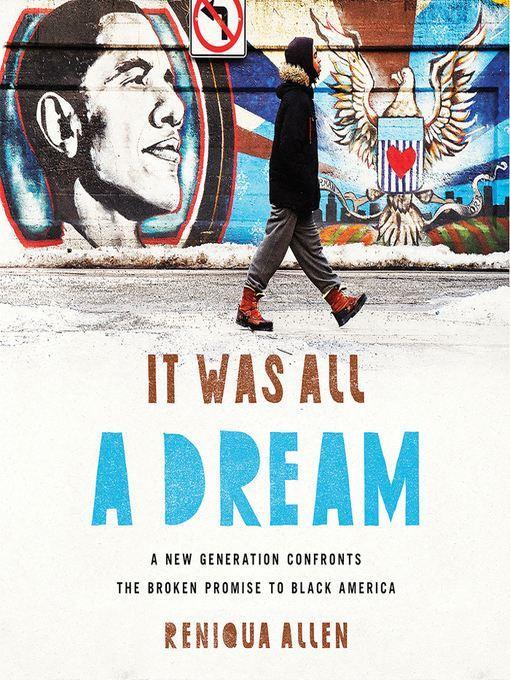
It Was All a Dream
A New Generation Confronts the Broken Promise to Black America
کتاب های مرتبط
- اطلاعات
- نقد و بررسی
- دیدگاه کاربران
نقد و بررسی

October 15, 2018
Black millennials offer candid views of the challenges they face.In her first book, journalist and broadcast producer Allen, an Eisner Fellow at the Nation Institute, investigates how the enduring myth of the American dream relates to young blacks between the ages of 18 and 30: "folks," she writes, "who looked like me." The American dream--"the idea that anyone can succeed and enjoy a prosperous life through hard work"--applies, the author asserts, only "to a limited number of people." For oppressed and marginalized blacks, the dream has been largely unattainable. Has that changed, Allen asks, for a new generation? What does upward mobility look like for them? How do they express their own dreams? Drawing on interviews with 75 millennials as well as studies, surveys, and articles, the author recounts stories of defeat and dashed hopes from blacks who feel that the American dream "wasn't and isn't for them." Among their frustrations is education: Many believe that a college degree is essential to their future success, accumulating huge debt to pay for schooling. More than 80 percent of Blacks who complete bachelor's degrees have debt upon graduating, compared with 64 percent of whites. Moreover, a college education does not ensure employment: "The unemployment rate for Black college graduates is the same as for White high school graduates." For those who manage to pursue a professional career, the workplace often feels unwelcoming. As one woman told her, "Black millennials do not have stability and security" in their jobs; they are often paid less than whites, are not offered career guidance and mentorship, and "often walk a tightrope between the hood and the elite." Home ownership eludes many blacks, as well, with redlining and predatory lenders victimizing prospective buyers. Frustrated with their efforts to hold on to middle-class status, some blacks are redefining what success means to them, rejecting 'the White-picket fence version of the dream" in favor of "what the dream means at its core: freedom."Sad, revealing testimony to the continuing effects of racism and inequality.
COPYRIGHT(2018) Kirkus Reviews, ALL RIGHTS RESERVED.

December 1, 2018
Allen, a fellow at the Nation Institute, explores the ways in which black millennials aspire to the American Dream. Although black millennials have fewer opportunities than their parents and white counterparts, she argues that they are successful in different ways. Additionally, she aims to provide a counterpoint to the media's focus on white millennials. Through a series of interviews and her own personal experiences, Allen uncovers her subjects' thoughts on education, marriage, activism, home ownership as well as the challenges they face. Allen briefly delves into the history of each topic in order to provide background and a contrast to her subjects' experiences. Work is a central focus, and the author includes interviews with blue-collar employees, office workers, and Hollywood creatives. Interludes between chapters allow black millennials to tell their stories in their own voices on topics such as incarceration, identity, and immigration. Allen retains a sense of optimism about her subjects and believes that despite their challenges, they will be okay. VERDICT A thoughtful account depicting the lives of a marginalized yet optimistic generation, recommended for readers interested in race and identity.--Rebekah Kati, Univ. of North Carolina, Chapel Hill
Copyright 2018 Library Journal, LLC Used with permission.

Shayna Small's narration is empathetic, honest, and direct. She lends her voice to a series of black millennials who believe that the cultural shift signaled by the Obama presidency has failed to materialize. Allen's audiobook presents interviews with those who continue to face pervasive, ingrained cultural barriers in their search for the "American Dream." Despite taking on multiple degrees and additional debt and experiencing the "black tax" (having to work exponentially harder than their white peers), they find themselves in an age of growing inequality. A student athlete, a coal miner, a young conservative on campus--many voices are represented. Small delivers each with clarity and skill, creating an evocative audiobook. S.P.C. � AudioFile 2019, Portland, Maine

December 1, 2018
?What is the American Dream, Allen asks, and what does it mean to America's black millennials (whom she defines as people born between 1980 and 2000)? To find the answer, she has conducted some 75 wide-ranging interviews with members of that population from across America. She shares her findings in nine topical chapters dealing with such subjects as life in New York City and the current black migration from the North to the South, turning the Great Migration on its head and pointing out that Atlanta has seemingly become the capital of the newly arrived black millennials. Then there is student debt, the lives of sex workers, Hollywood fame, and more, all told through the lives of her interviewees. Throughout, Allen pursues her own version of the American Dream, finding part of it in home ownership, a career in media, and attaining visibility. Much of her book is, frankly, depressing as she vividly demonstrates the often heartbreaking challenges of being black in contemporary America. Attention must be paid, though, and Allen has done an excellent job of insuring that will happen.(Reprinted with permission of Booklist, copyright 2018, American Library Association.)

























دیدگاه کاربران